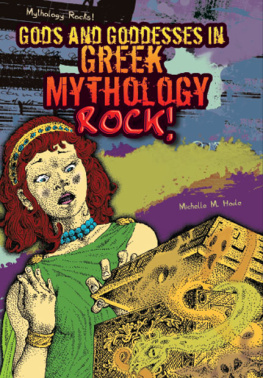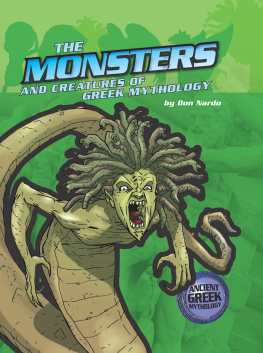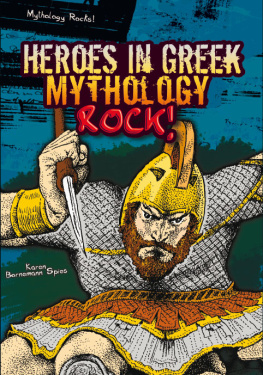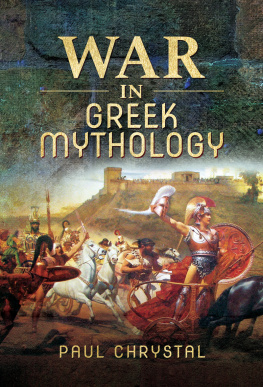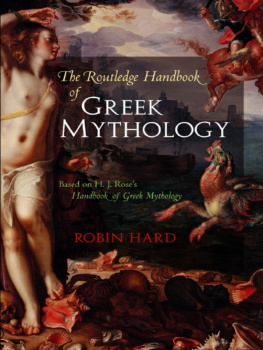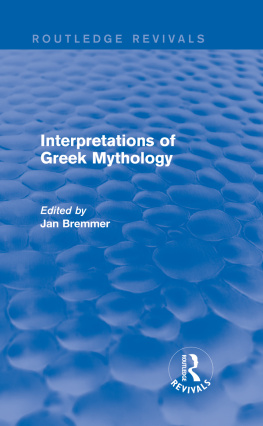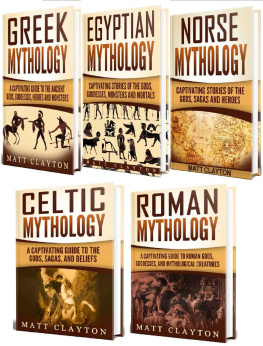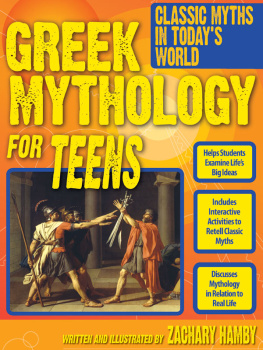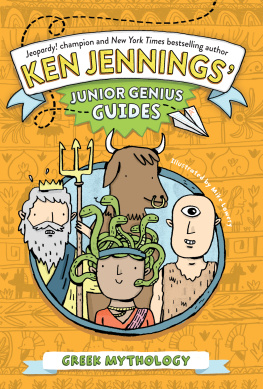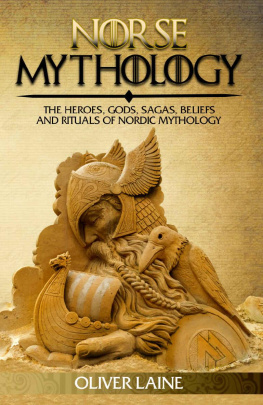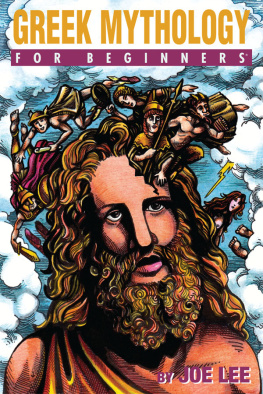PREFACE
While familiarity with classical mythology is generally recognized as essential to the understanding of literature and art and to the preservation of a great and valuable part of our artistic and spiritual heritage, the method of assuring such a familiarity to the rising generation differs in different schools. In many the stories of the gods and heroes are read in the lower grades from one or another of the children's books based on the myths, and any further knowledge of the subject depends upon the study of Vergil and other Latin or Greek writers and on the use of reference books in connection with reading in English literature. In many schools, however, experience has proved that as even the most elementary knowledge of mythology gained in childhood cannot be presupposed, and as the knowledge gained from the occasional use of reference books is unsubstantial and unsatisfactory, a systematic course in mythology for students of highschool age is necessary. It might seem that to such students this subject would be so simple as to present no difficulties, but the fact is that to those who come to its study, as surprisingly many do, with such entire unfamiliarity that the name of Apollo or Venus conveys nothing to them, the mass of new and strange names and the divergence of the conceptions from those to which they are accustomed make the study not a little difficult. After many years' experience with such students the writer has been led to believe that there is need for a text book in a style to appeal to those who have outgrown children's books, but of content so limited and treatment so simple as to make it possible for the average boy or girl to assimilate it in a course of about thirty lessons. To secure brevity and simplicity only the most famous and interesting of the stories have been incorporated in this book; certain others are briefly mentioned in the index. In reading a narrative it is difficult for an inexperienced student to distinguish between the important names and those that merely form part of the setting of the story. The mention of any names beyond those that should be remembered has therefore been avoided, and the effort has been made by reiteration and cross-reference to impress these names upon the student.
In preparing an elementary book on mythology there are naturally two purposes to be kept in mind: (1) By a sympathetic and accurate treatment to give understanding and appreciation of the character and ideals of the people among whom the mythology developed. Any study that gives this understanding and appreciation of one of the peoples through whom our own spiritual life and civilization has come to be what it is is believed by the writer to be important to an intelligent valuation of our present life and ideals and to a sane building for the future. (2) By placing the familiar stories in their proper relation to enable the student better to understand references in literature and representations in art, ancient and modern. Because of the subjective element in the treatment of mythology in later ages the conceptions have become confused. It is the writer's belief that to avoid confusion and misunderstanding on the student's part the subject should not be treated through the medium of modern writers and artists, whose interpretation of Greek thought and religion has been affected by the thought and religion of their own times, but that by the use of ancient sources, careful study of the people's own understanding of their mythology, direct quotation and free reproduction of the works of Greek and Latin poets, illustrations drawn from Greek sculpture and painting, the effort should be made to leave an honest picture of the mind of the Greeks. Therefore reference has not been made in the text to English poems based upon the myths, but it has been left to the individual teacher carefully to introduce such illustrations and parallels; an appendix suggests a few of the more notable. Another misunderstanding that it is sought to avoid is the popular association of these anthropomorphic conceptions and imaginative tales with the Romans. The writer has wished to make it clear that what is known as classical mythology is a product of Greece, and that in general the Latin writers have merely retold stories that were not original with their people. The Greek names have therefore been employed primarily, even though they are less familiar than the Latin. It may seem inconsistent that this has been done even when the version of a tale as it appears in the work of some Latin poet, e.g., Ovid, has been followed, but it is not the nomenclature, which-is Latin, but the subject matter and the conception of the tale, which is Greek, that has been followed. Where the story is mainly of Latin development Latin names have been used. Perhaps it may seem that too scant attention has been paid to Roman gods, but when one deals with Roman deities one quickly gets out of the realm of mythology into that of ritual and history, subjects which seem out of place in such a book as this.
In spelling Greek names the most familiar and the simplest English spellings have been used. In most cases has been transliterated by English i, (Poseidon is a common exception, and e takes the place of before the terminations a, as, us, as Me dea, Au geas.) K has been rendered c, by by Latin us. In these inconsistencies the usual and permissible custom is followed. In the index and upon their first mention the accent on names of more than two syllables is indicated, and in an appendix a few simple rules of pronunciation are given.
While in many instances in a foot-note the version of a story followed has been indicated, and in case of direct quotation the reference has been given, in an elementary book such as this the use of many notes has been avoided as undesirable. In many stories one author has not been followed exclusively, but various features have been borrowed from various sources. Those chiefly followed are: Homer, the Homeric Hymns, Hesiod, Pindar, schylus, Sophocles, Euripides, Apollodorus, Apollonius Rhodius, Hyginus, Pausanius, Vergil, and Ovid. In quoting from the Iliad the translation of Lang, Leaf, and Myers has been used; from the Odyssey, that of Butcher and Lang; and from the Homeric Hymns, that of Lang. Of modern authorities consulted the most important are: Preller's Griechische Mythologie revised by Robert (unfortunately incomplete) ; Wissowa's Religion und Kultus der Rmer; separate articles in Roscher's Lexikon der griechischen und rmischen Mythologie; the Pauly-Wissowa Real-Encyclopdie der classischen Altertumswissenschaft. Frazer's Golden Bough, Jane Harrison's Prolegomena to the Study of Greek Religion, Lawson's Modern Greek Folklore and Ancient Greek Religion, Warde Fowler's Roman Festivals, and many other books and articles have been helpful and suggestive. The comprehensive works of Collignon, Baumeister, Overbeck, Furtwngler, and others have, of course, been taken as authorities in dealing with representations in art.
J. M. Tatlock.
December, 1916.
INTRODUCTION
Primitive people, as they have looked out on the world about them, on the sea and the trees, on the sky and the clouds, and as they have felt the power of natural forces, the heat of the sun, the violence of the wind, have recognized in these things the expression and action of some being more powerful than themselves. Able to understand only those motives and sensations that are like their own, they have conceived these beings more or less after their own nature. The Hebrews, indeed, at an early time recognized one supreme God, who had created and who directed all the world according to his will, but most other early people have seen living, willing beings in the forms and powers of nature, and have worshiped these beings as gods or feared them as devils. Physical events, such as the rising and setting of the sun, or the springing and ripening of the grain, are to them actions of the beings identified with sun or grain. In accounting for these acts, whether regularly recurring, as the rising of the sun, or occasionally disturbing the ordinary course of nature, as earthquakes, eclipses, or violent storms, stories more or less complete grow, are repeated, and believed. These stories told of superhuman beings and believed by a whole people are myths, and all these myths together form a mythology.



